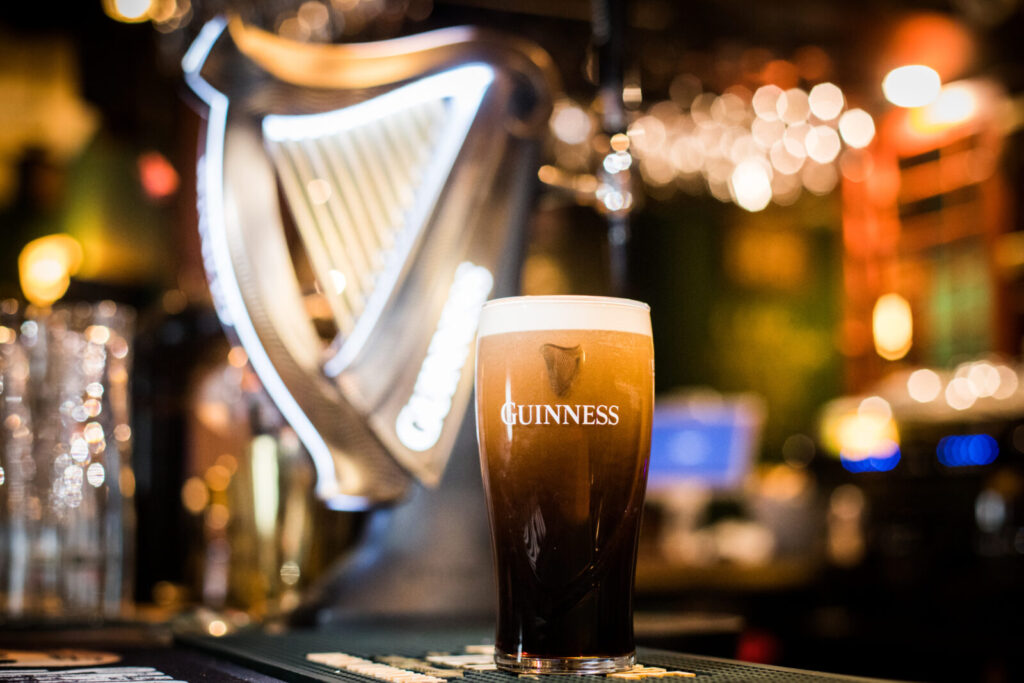Brief • 3 min Read
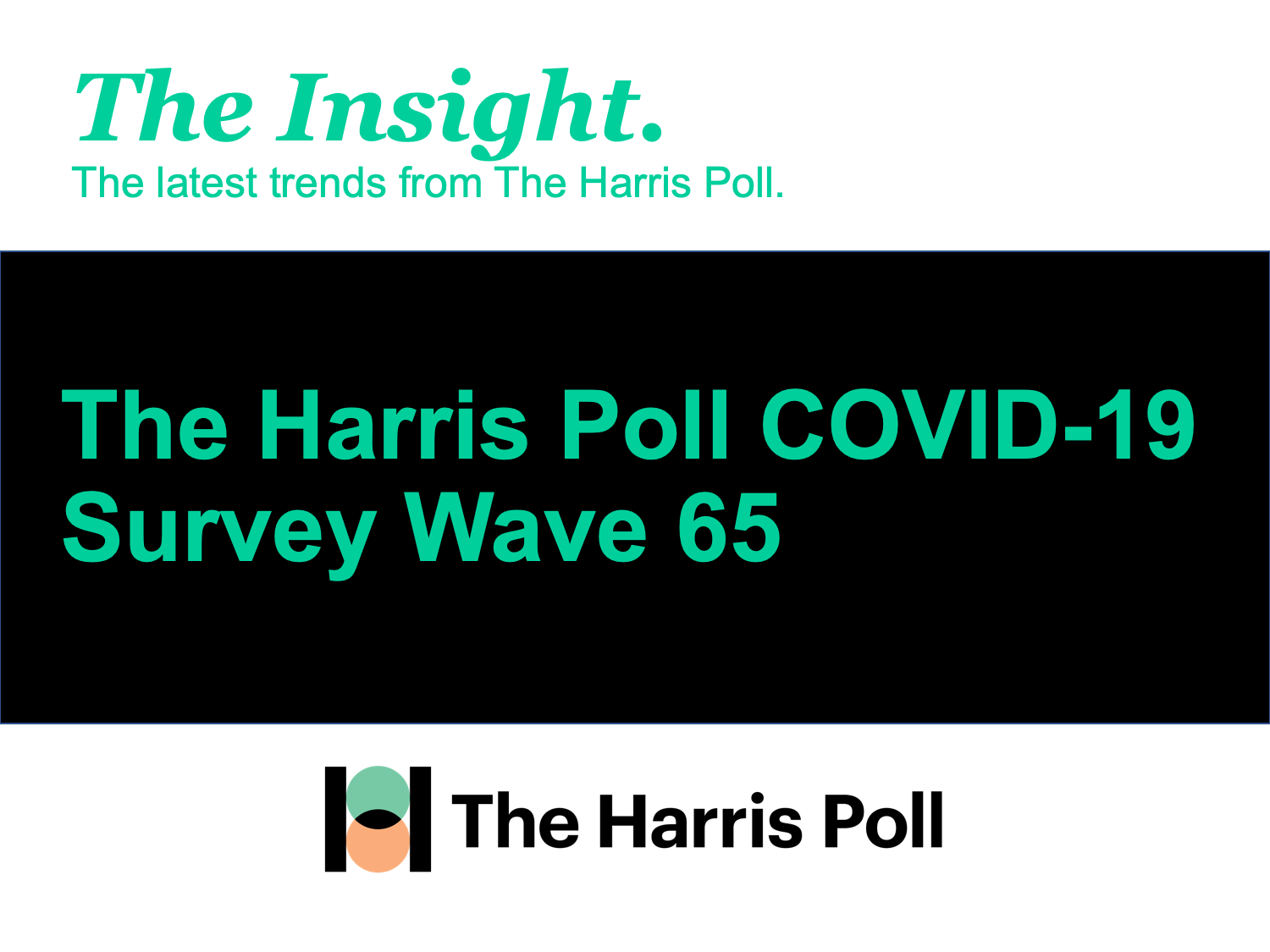
In The Harris Poll COVID-19 Tracker (Week 65) fielded May 21st to 23rd, 2021 among 2,072 U.S. adults, we look at the CDC’s new mask guidelines’ effect on willingness to get vaccinated, pandemic pets, Older Millennials and the decision to have kids, the pandemic’s effect on the DNA of workplaces, and how cryptocurrency is spreading to big name retailers.
As a public service, our team has curated key insights to help leaders navigate COVID-19. Full survey results, tables, and weekly summaries can be accessed for free at The Harris Poll COVID-19 Portal. We will continue to actively field on a regular cadence to track the shifts in sentiment and behaviors as the news and guidelines evolve.
Is the CDC’s New Mask Policy Working Out? TIME-Harris Poll
As demand for vaccinations drops nationwide, states are turning to increasingly dramatic measures to convince people to get their shots. But perhaps the boldest incentive yet has come from the CDC, which last week said that fully vaccinated people can go maskless, inside and out. More from our new survey in partnership with TIME featured in their Coronavirus Brief newsletter:
- Nearly four in ten (37%) of people vaccinated in the last seven days said that the CDC’s new mask policy encouraged them to get a shot.
- But the data also reveal an arguably more interesting finding: When asking those who’d been vaccinated in the last seven days why they’d gotten a shot, almost half (48%) said they got vaccinated, at least in part, because they wanted to protect themselves around maskless unvaccinated people.
- Although the theme behind driving forces revolves around protecting oneself from the virus, more than half (53%) of those vaccinated in the last seven days reported wanting to protect others who could not get the vaccine themselves. This figure was also high for those who plan to get vaccinated (49%).
- Yesterday, Colorado was the latest state to introduce a lottery system to entice stragglers.
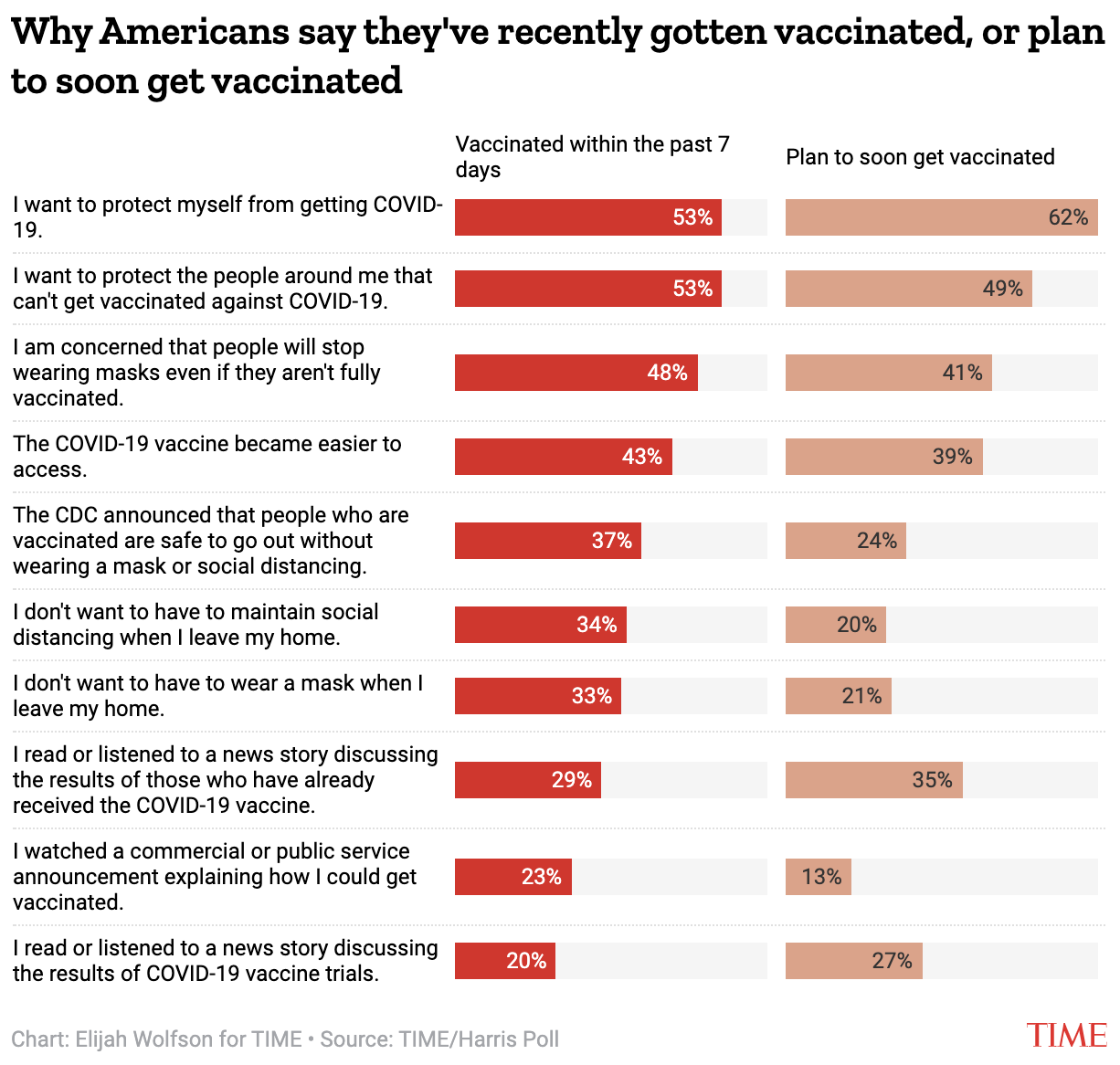
Takeaway: Whether that was the CDC’s intended result or not, it does seem that its mask policy is affecting people’s decisions about vaccination. And with demand slowing, any uptick, regardless of reasoning, is a good sign.
Pandemic Pets: Rash Decision or Lifelong Friend?
The lockdown in the early months of the COVID pandemic made Americans realize a harsh truth: they were lonely. Many resorted to adopting pets as a proxy for companionship and shelters couldn’t keep up with the demand. Now that the country is returning to normal, some pets are being returned and shelters are facing potential overcrowding.
- Four in ten (44%) of Americans took in a pet during the pandemic, whether it be through adoption, buying from a breeder, or a foster fail. Nearly half (48%) consider themselves first time pet owners.
- Altruism is to blame: One third (33%) say they got a pandemic pet because they wanted to help an animal in need. For younger Americans, however, the need for companionship (35% Millennials), and the emotional support of a pet (34% Gen Z) were the driving factors behind bringing home a friend.
- Three-quarters (73%) of those who brought in a pandemic pet said they never considered returning it. Millennials, however, were most likely to say that they at least considered it (37%). Ironically, Millennials were one demographic most likely to get a pet (61%).
- Most Americans (40%) think owners rushed their decision to get a pet, which is why they are returning them. In terms of what Americans think is an acceptable reason to return a pet, one third (32%) say that not being able to afford the pet is understandable.
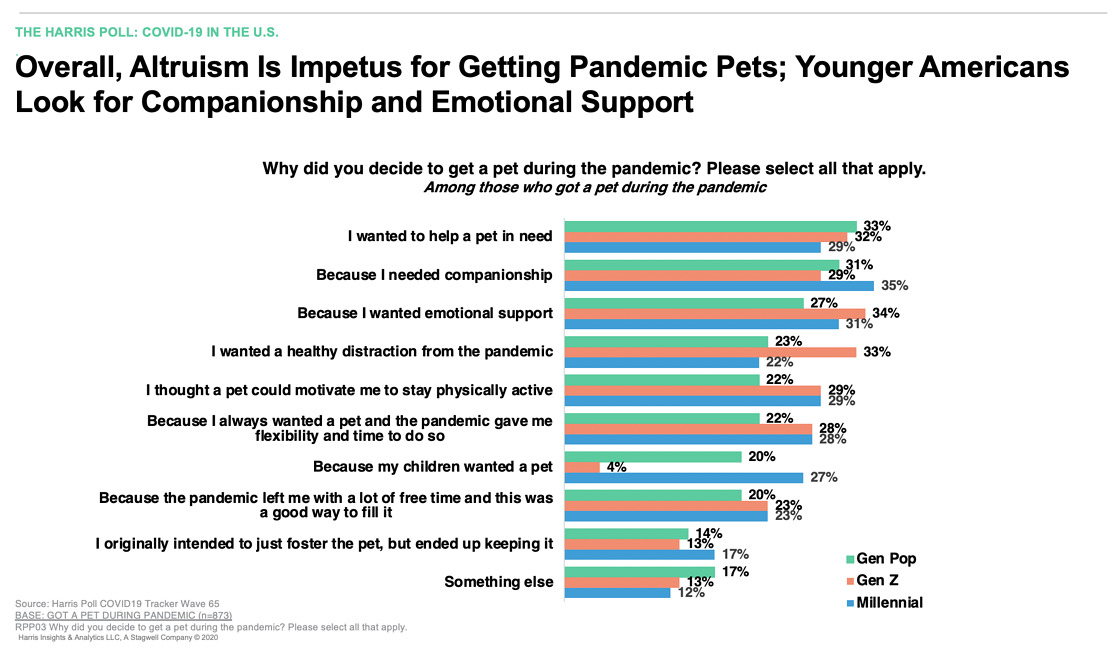
Takeaway: Americans are returning to the office full-time but that doesn’t mean your pet has to suffer with adjusting to not having their “pawrents” home. Consider the advice the American Kennel Club shares when it comes to transitioning your pet to being home alone.
Older Millennials Uncertain About Expanding Their Families: CNBC-Harris Poll
This week in our partnership series with CNBC “Middle-Aged Millennials,” we take a look at the effect of two economic crises on the decision to have children.
- A quarter of Older Millennials (25%) say they decided to wait longer to have children because of the pandemic.
- Some are avoiding having children altogether. One in five (19%) of Older Millennials say they have decided not to have a child or additional children at this time because of the pandemic.
- Among those who find they want children less following the pandemic, the most common reason is that they don’t want to bring a child into the world right now, followed by uncertainty about the economy.
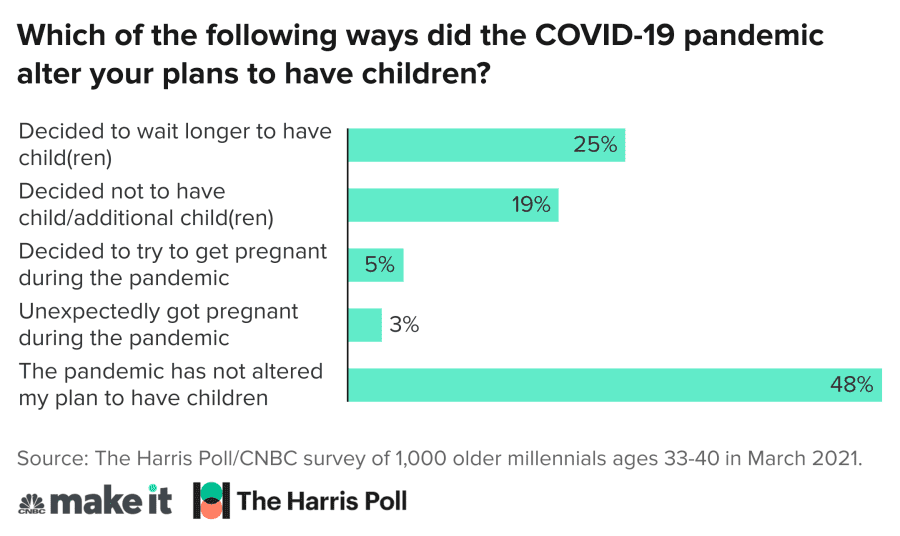
Takeaway: While it’s too early to tell what impact the pandemic will have on birth rates specifically among Older Millennials, data indicates that Americans typically have fewer children during and immediately after economic downturns, says Phillip Levine, an economics professor at Wellesley College who has studied birth rates.
The DNA of Work Has Changed: USA Today-Harris Poll
With the COVID-19 pandemic waning, a hybrid model that allows employees to work from home part-time seemed to be gaining favor among companies and workers, we find in our survey shared exclusively with USA Today.
- Four in ten (40%) of Americans prefer to work from home full-time, compared with (35%) who seek a home-office hybrid and (25%) who want to go back to the office full-time.
- Workers’ top concern about returning to their cubicles is losing the flexibility remote work provides (36%). Many workers also point to social anxieties, too. (35%) are leery of having to engage in small talk; and (28%) of having forgotten how to socialize.
- Although most of those surveyed would like to work from home at least part-time, (36%) say their companies expect all employees to be back in the office full time in the next four to six months and another (29%) say they’ll need to be back by the end of the year.
- Nearly half (47%) say their firmshaven’t surveyed employees or provided them a platform to express concerns to gauge their interest in returning to the office full-time.
Takeaway: The wants of employees seem to be clashing against most U.S. businesses that want their workforce back in the office, but companies will likely need to find middle ground or be willing to lose workers.
Whole Foods, Starbucks Use Crypto – Should Loyalty Programs Be Next? Forbes-Harris Poll
The current, post-pandemic environment is pretty near perfect for cryptocurrency’s spread. Consumers quickly adapted to a range of new technologies in the past year, so their appetite for change has been whetted. Forbes writes more about our survey conducted on behalf of Couponcabin.com:
- Nine in ten (89%) of Americans have at least heard of cryptocurrencies, with seven in ten (71%) being familiar with Bitcoin – the world’s largest crypto by market cap.
- You can’t hold loyalty in your hand: (44%) of Americans are interested in receiving encrypted, digital currencies, such as Bitcoin, Ethereum and Dogecoin, as an alternative to traditional cash-back reward programs from retailers.
- More than three in ten Americans (31%) describe cryptocurrencies as the “future of money.” Not surprisingly, younger consumers are early adopters – nearly (28%) of millennials own or have owned some form of cryptocurrency.
- Some major retailers are now accepting the currencies: Starbucks allows its rewards members to convert crypto to cash balances on their cards using an app called Bakkt. Whole Foods, Nordstrom, Ulta, and Crate & Barrel also accept the Spend app, which allows customers to use crypto for payment.
- CNBC looks at how brands are capitalizing on the popularity of the meme cryptocurrency Dogecoin.
Takeaway: Cryptocurrencies are changing fast, and they are altering the financial industry with equal speed. If retail loyalty adopts them, it can expect the same. By tracking the successes and missteps of early adapters, retailers may get a real hold on crypto success.
Subscribe for more Insights
Subscribe to our newsletter for the latest trends in business, politics, culture, and more.
Download the Data
This survey was conducted online within the U.S. by The Harris Poll from May 21 to 23, among a nationally representative sample of 2,072 U.S. adults.
Download
Subscribe for more Insights
Subscribe to our newsletter for the latest trends in business, politics, culture, and more.
Download the Data
This survey was conducted online within the U.S. by The Harris Poll from May 21 to 23, among a nationally representative sample of 2,072 U.S. adults.
DownloadRelated Content







